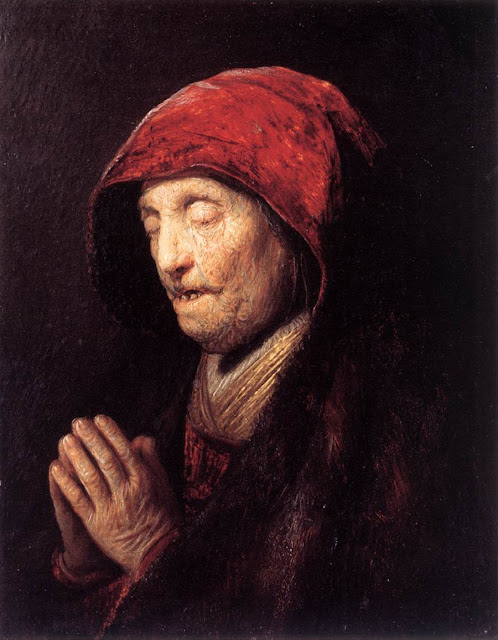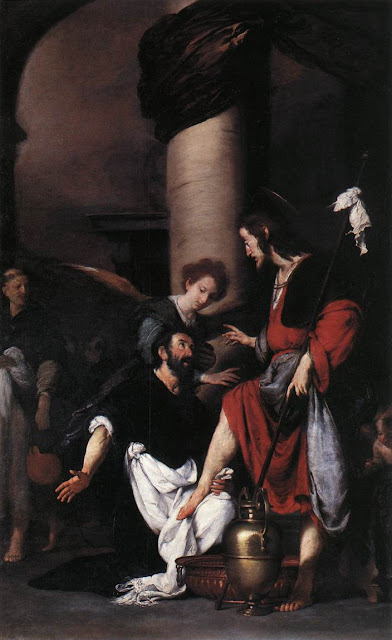Moses, Michelangelo, 1515
San Pietro in Vinculo, Rome [Web Gallery of Art]
(First Reading, Exodus 17:8-13)
Readings (New American Bible: Philippines, USA)
Readings (Jerusalem Bible: Australia, England & Wales, India [optional], Ireland, New Zealand, Pakistan, Scotland, South Africa)
Gospel Luke 18:1-18 (New Revised Standard Version, Catholic Edition, Canada)
Then Jesus told them a parable about their need to pray always and not to lose heart. He said, “In a certain city there was a judge who neither feared God nor had respect for people. In that city there was a widow who kept coming to him and saying, ‘Grant me justice against my opponent.’ For a while he refused; but later he said to himself, ‘Though I have no fear of God and no respect for anyone, yet because this widow keeps bothering me, I will grant her justice, so that she may not wear me out by continually coming.’” And the Lord said, “Listen to what the unjust judge says. And will not God grant justice to his chosen ones who cry to him day and night? Will he delay long in helping them? I tell you, he will quickly grant justice to them. And yet, when the Son of Man comes, will he find faith on earth?”

Old Woman Praying, Rembrandt, 1629-30
Residenzgalerie, Salzburg, Austria [Web Gallery of Art]
Last Sunday’s story about the ten lepers healed by Jesus and only of whom came back to thank him, a Samaritan, a ‘foreigner’, told us the importance of gratitude to God for everything, especially for the gift of life itself and the gift of faith.
Today’s First Reading and Gospel – the two are always linked by a common theme – stress the importance of prayer as an expression of faith. Prayer is the expression of being in a living relationship with God, an expression of a living faith.
But the gift of faith can be lost by an individual, by a whole community, by a whole section of the world. In the early centuries of Christianity North Africa had a vibrant Church and produced great bishops and theologians such as St Augustine of Hippo, which is in Algeria. Today there is only a handful of Christians in that country, nearly all either missionaries or workers from other countries.

St Augustine Washing the Feet of Christ, Bernardo Strozzi, 1629
Accademia Ligustica di Belle Arti, Genoa, Italy [Web Gallery of Art]
A hundred years ago European countries such as Belgium, Netherlands and Ireland were sending Catholic missionaries all over the world. These countries now to a large extent have rejected the Christian faith. In both Belgium and the Netherlands not only is abortion legal but so is euthanasia. Recently a minor, a 17-year-old boy, was euthanised in Belgium.
My own Irish ancestors received the grace of faith through St Patrick and other missionaries in the fifth century and sent missionaries such as St Columban, the patron saint of Columban missionaries, to rekindle the faith in mainland Europe where it was being rejected.
The founders of the European Economic Union, the EEC, that developed later into the European Union, the EU, had a vision for a Europe at peace that came from their strong Catholic faith. They had experienced the destruction brought about by Nazism and Fascism before and during World War II. Their political vision came from their Catholic Christian faith. They weren’t working ‘for the Church’ but living out as politicians the Gospel of Jesus Christ that they had received through the Church, living out a faith nourished by the Church, especially through the Mass and the sacraments.
That Christian vision of Jean Monnet (France), Konrad Adenauer (Germany), Alcide de Gasperi (Italy) and Robert Schuman (Luxembourg/Germany/France) has been largely lost. Schuman, described by Adenauer as ‘a saint in a business suit’, had a great devotion to St Columban. Both he and de Gasperi have been proposed for beatification.
Yet so many ‘Catholic’ politicians and voters in the Western world proclaim themselves, for example, as being ‘personally opposed to abortion’ but then vote otherwise. Their values are not rooted in their Christian faith. Christian voters in the USA are now faced with a huge moral dilemma when it comes to voting for the country’s next president a few weeks from now.

Massacre of the Innocents (detail), Pieter Bruegel the Elder, 1565-57
Kunsthistorisches Museum, Vienna [Web Gallery of Art]
How many of us take to heart the words of Pope Francis in his encyclical on ‘On Care for Our Common Home’, Laudato Si’ No 117: Neglecting to monitor the harm done to nature and the environmental impact of our decisions is only the most striking sign of a disregard for the message contained in the structures of nature itself. When we fail to acknowledge as part of reality the worth of a poor person, a human embryo, a person with disabilities – to offer just a few examples – it becomes difficult to hear the cry of nature itself; everything is connected. Once the human being declares independence from reality and behaves with absolute dominion, the very foundations of our life begin to crumble, for ‘instead of carrying out his role as a cooperator with God in the work of creation, man sets himself up in place of God and thus ends up provoking a rebellion on the part of nature’?
Prayer essentially leads us into desiring to do God’s will and, with his grace, actually doing it, so that we can say with St Paul, But we have the mind of Christ (I Corinthians 2:16). The first part of the Opening Prayer of today’s Mass reads: Almighty ever-living God, grant that we may always conform our will to yours . . .
To the extent that, with God’s grace, we have the mind of Christ, to that extent we are persons of faith. May the Son of Man find each of us to be such now and at the hour of our death!
+++
When the Son of Man comes, will he find life in Aleppo?’
The story of Abu Wad, ‘Father of the flowers’, and his 13-year-old son Ibrahim is both heartbreaking and hope-filled. May we continue to pray for peace in Syria, especially in Aleppo.
Holy Mass and Canonization of the Blesseds James Berthieu, Pedro Calungsod, John Baptist Piamarta, Carmen Sallés y Barangueras, Marianne Cope, Kateri Tekakwitha, Anna Schäffer
Saint Peter’s Square, 21 October 2012 – 29th Sunday in Ordinary Time
Antiphona ad introitum
Entrance Antiphon Cf Ps 16 [17]: 6, 8
Ego clamavi, quoniam exaudisti me Deus;
To you I call; for you will surely heed me, O God;
inclina auerem tuam, et exaudi verba mea.
turn your ear to me; hear my words.
Custodi me, Domine, ut pupillam oculi;
Guard me as the apple of your eye;
sub umbria alarum tuarum protege me.
in the shadow of your wings protect me.

